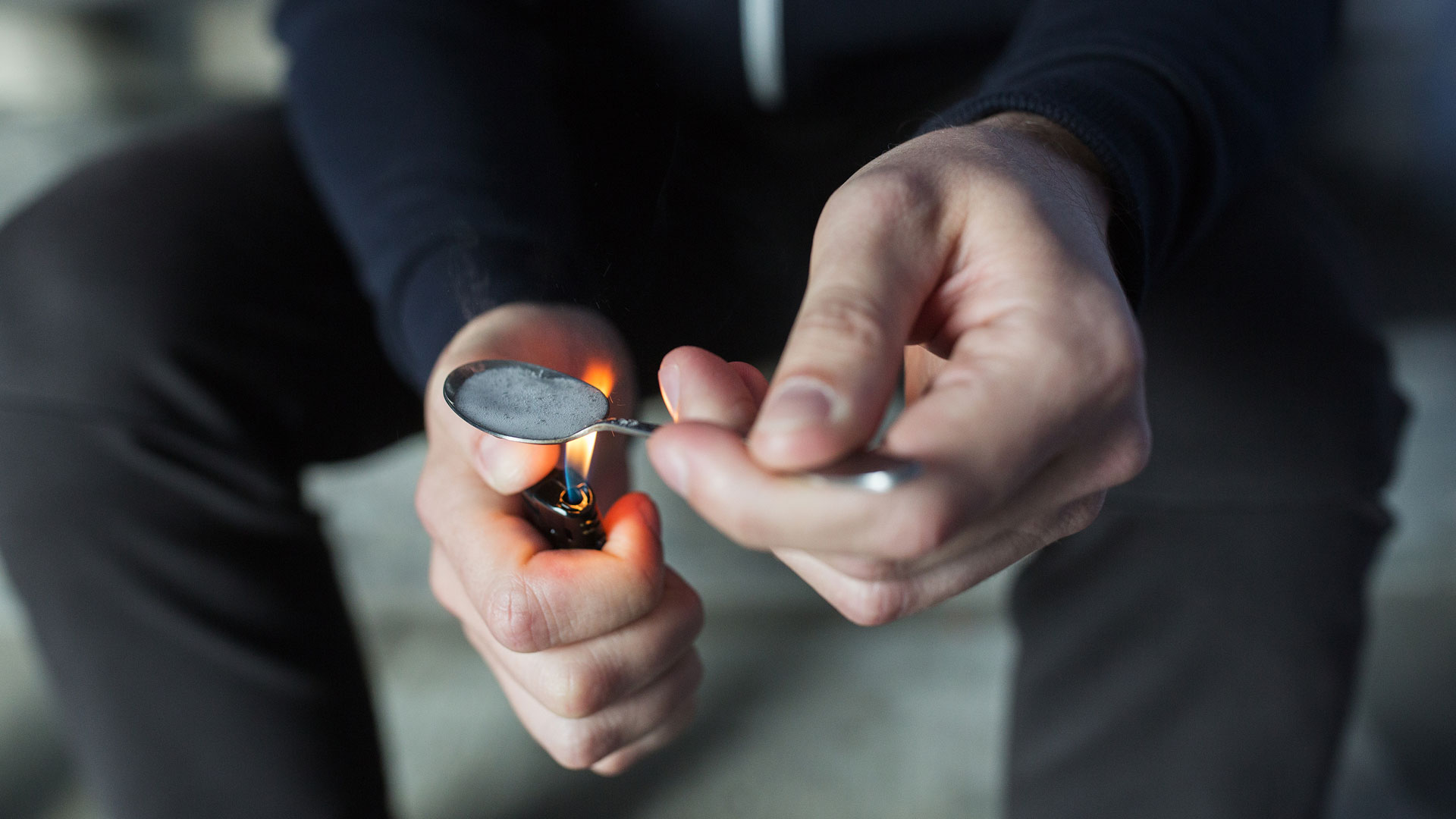04 Aug How Long Does Heroin Stay in Your Urine?
Table of Content
Heroin is an illicit drug used for recreational purposes. The opioid has risen in popularity over the decades and was once looked at as an inner city “street” drug only. However, in the past few years, the use of heroin has infiltrated suburban areas and has become a topic of nationwide concern.
According to the U.S. Drug Enforcement Agency, deaths caused by heroin have tripled over the past five years. Why? It’s less expensive and more potent than what it was two decades ago with easier access for purchase. “The Triangle” area, in and around Atlanta, has reported a heroin-related death count increase of 3,844 percent reaching Fulton, Gwinnett, Cobb, and DeKalb counties.
People who use heroin may have first become addicted to prescribed opioids as painkillers. Since heroin is much more readily available and cheaper, users turn to the street drug to get the fix they once received from their prescriptions. Due to its highly addictive nature, anyone can become drug dependent on heroin, which is only one of the many dangers the drug carries.
How Long Does Heroin Stay in Your Urine? Heroin has a half-life estimated at approximately 30 minutes. This means that the concentration of the drug in the blood is reduced by one-half 30 minutes following ingestion. The actual effects of heroin can last much longer, up to 4-5 hours, but depending on a list of factors, the length of time heroin stays in your urine will vary.
For example, a user’s height and weight can determine how much can be consumed before the individual feels any effects. A person who weighs more may have a slower time metabolizing the drug than someone who weighs less. That’s just one determining factor.
The amount of heroin a person consumes will also decide how long it stays in the urine. If a person takes several doses within the same day at higher quantities, the drug will hang around longer than if someone took a smaller amount and only dose. The general health of a person will affect how the drug is broken down in the system. Every situation is different with only approximate times available to know just how long heroin will stay in your urine.
Drug Testing for Heroin
Drug testing may be necessary to apply for or maintain certain employment. Addicts in rehab may be subject to drug tests. And, people who have been convicted of a crime may also have to take drug tests.
There are four main types of drug testing methods:
- urine drug test (and urine, the most common kind is urine testing)
- hair testing (uses a hair follicle sample and can detect for much longer periods than urine)
- blood sample drug test
- saliva drug test
Each drug test is FDA-approved and detects heroin in the system at different points in time after ingestion.
A urine drug test for heroin (more specifically, opioids like fentanyl, oxycodone, tar heroin, etc.) through a urine sample can detect a positive result in the body for up to three days after the last use. This is longer than the 12 hours that is typically needed for heroin detection in a blood test or saliva tests. Finally, heroin can be detected for up to three months after use with a hair follicle test.
Symptoms of Heroin Abuse
Heroin is a fast-acting drug both when it’s snorted or injected. When a person injects the drug directly into his/her bloodstream, the feeling of euphoria is immediate, which is why many drug users prefer this method. However, some users opt for snorting the white powder version of heroin instead to avoid any traces of marks or bruising on the skin from where the needle pierces.
Once a user has ingested heroin, he or she will feel their skin feel flush and immediately get dry mouth. The user will commonly drift in and out a state of being awake or even nod off suddenly. Typical signs of heroin ingestion also include nausea, vomiting, itching, and constipation.
When using needles, heroin users face additional health risks. The sharing of needles or use of dirty needles spread infection and diseases such HIV/AIDS and hepatitis, in addition to the long-term health hazards associated with heroin use alone.
If you suspect one of your loved ones is using heroin, take notice of any paraphernalia they leave lying around or carry with them. Syringes, burnt spoons, glass pipes, and white powdery residue are all signs pointing to heroin use. It’s better to confront a problem head on, then avoid it and wait until it’s too late. Every time a person uses heroin, he or she is at risk for overdose.
Symptoms of Heroin Overdose
Over half of the people who use heroin are addicted to the drug, according to the National Institute on Drug Abuse. With this type of dependent behavior so prevalent, it’s important to know the signs and symptoms of a heroin overdose.
An overdose occurs when a person has taken a significant amount of heroin or any other type of substance. A heroin overdose can happen to anyone. For someone new to using the drug, their body may have an intense, immediate reaction or the heroin used may have been mixed with other drugs.
For addicts who have used heroin for a longer period, they have built a tolerance to the drug, which means they require more of it to feel the same effects. They may snort several lines of heroin at one time or inject a higher dose than intended into their bloodstream.
When the body cannot handle the amount of heroin in the system, overdose symptoms will be present, such as:
● Difficulty breathing
● Dilated pupils
● White patches on the tongue
● Drop in blood pressure
● Reduced heart rate
● Muscle spasms
● Bluish tinge to the mouth and fingernails
A heroin overdose is an emergency situation and requires immediate medical attention. It can lead to a stroke, coma, or all too often, death.
How Long Does Heroin Withdrawal Last
The more a person uses heroin, the greater the chances are that he or she will become dependent on the drug. Once a user becomes dependent, the body can no longer function normally without having the drug in the system. Withdrawal symptoms will take effect, which are painful and uncomfortable. This addiction affects every aspect of a person’s life and can do damage physically, emotionally, and financially.
Heroin addiction affects work life and personal relationships leading people to lose their jobs and put their connections with family and friends in jeopardy. A person’s physical appearance changes and their health deteriorates. Once the body has become addicted to heroin, it’s not likely a person can quit cold turkey on their own. There has been such a significant change to the body and its chemical makeup due to drug use that it’s highly recommended for a person who suffers from substance abuse and wishes to stop using seek professional help.
For anyone who has tried to quit on their own before, the withdrawal symptoms are usually too much to handle. A person may quit using for a day or two, but then immediately return to their regular habits. In the first few days, those who go through withdrawal may suffer vomiting, shaking, and severe body aches. These symptoms can last up to 7 or 8 days after the last drug, and the level of severity will depend on how long the person has used.
Completely ridding the body of heroin without using again is only the first step in becoming truly drug-free and switching to a sober lifestyle. If not prepared to quit use, addicts often relapse during the detox period because of the pain and discomfort they feel.
When detoxing within a secure, monitored environment, there is medical support round-the-clock to help ease withdrawal symptoms as much as possible and provide the type of strength and emotional support necessary to get through the process.
Getting Treatment for Heroin Addiction
Drug users concerned with how long heroin stays in their urine may be mostly interested because they know they have to perform a drug test. Once the body is rid of detectable heroin, they may start right back up using again without any desire to become sober even knowing heroin addiction is a dangerous path.
Drug abusers may not realize or accept they have a problem, especially if they haven’t hit rock bottom yet. If they still have a job and maintain interpersonal relationships, they may feel like they have a handle on their drug use. Since heroin is such a highly addictive drug, there is no way a person can ever be in control of their habit. Unfortunately, it usually takes something drastic for a person to see they need to make a serious lifestyle change.
When someone is ready to turn their life around and quit drug use for good, it’s necessary to have a plan in place where the person will automatically feel supported and see how it will benefit. No two people will have the same recovery experience, but there are similar treatments available, which can be customized to each person seeking help.
Inpatient and Outpatient Treatment
There are inpatient and outpatient treatment options available based on what works best for where a person is at in their addiction. Some people may be entering rehab for the first time. While others, may need treatment specifically for relapse or to avoid the temptation to use again.
Inpatient treatment gives people a chance to step outside their current environment and live within a safe and comfortable place set up in a structured and supportive atmosphere. This is beneficial because it takes a person away from the temptation of drugs and other harmful influences and provides tools with which to cope with cravings and resist the desire to use in the future. Understanding addiction and the behaviors associated with it are important because it helps uncover rooted issues rather than only tackling the surface.
With inpatient treatment, there is a schedule to day-to-day life which can give a sense of routine and stability, providing calm where there was once chaos. There are opportunities for group and individual counseling, which is crucial during the recovery period and helpful post-care. Also, most inpatient facilities require attendance for addiction education classes and support groups.
Some people opt to sign up for inpatient treatment within their city. Others take advantage of a more secluded atmosphere near calming surroundings like the ocean or mountains. A person’s environment has a huge impact on how successful treatment will go; the right place can make all the difference.
For people who choose outpatient care, there is still a structured environment available with professionals ready and willing to help addicts make the transition to drug-free living. These are usually within closer proximity to a person’s home where they feel most comfortable and can be in the company of loved ones.
Individuals who choose this option may not want to spend days away from their family or may need to continue a program following inpatient treatment. This type of care may be better suited for those who still maintain work or school schedules or have family commitments they still wish to uphold. Whatever kind of treatment is chosen, detox is always the first part of the process and post-care counseling and services are available to continue a sober lifestyle.
Addicts have to decide for themselves to seek treatment and ultimately, change their lives. Even if friends and family members decide to stage an intervention, a person has to be in the right mindset to want to become sober or else there is less likelihood treatment will be successful.
There must be a desire to get better. Fortunately, once the decision is made, there is support to make the transition as comfortable as possible. It’s not an easy road, but the effort is more than worth it.
We have been helping addicts and those who love them get the treatment they need at the time they need it most. It makes a difference knowing there is help available from people who truly care and have seen the effects of drug use and knows how it can destroy lives.
Stop spending time worrying about if you will pass a drug test, maybe instead consider seeking help. It’s never too late to get help. By making a decision to receive treatment for heroin abuse and addiction, it can change your life for the better. Let us help you find a better path for your future.
Sources:
T, Buddy. “How Long Does Heroin Stay in Your System?” Verywell Mind. 8 Nov. 2018. 4 March 2019. https://www.verywellmind.com/how-long-does-heroin-stay-in-your-system-80262
Lautieri, Amanda. “How Long Does Heroin Stay in Your System?” American Addiction Centers. 4 March 2019. https://americanaddictioncenters.org/heroin-treatment/how-long-in-system
“How Long Does Heroin Stay in Your System?” Rehabs.com. 4 March 2019. https://luxury.rehabs.com/heroin-addiction/how-long-does-it-stay-in-your-system/






No Comments